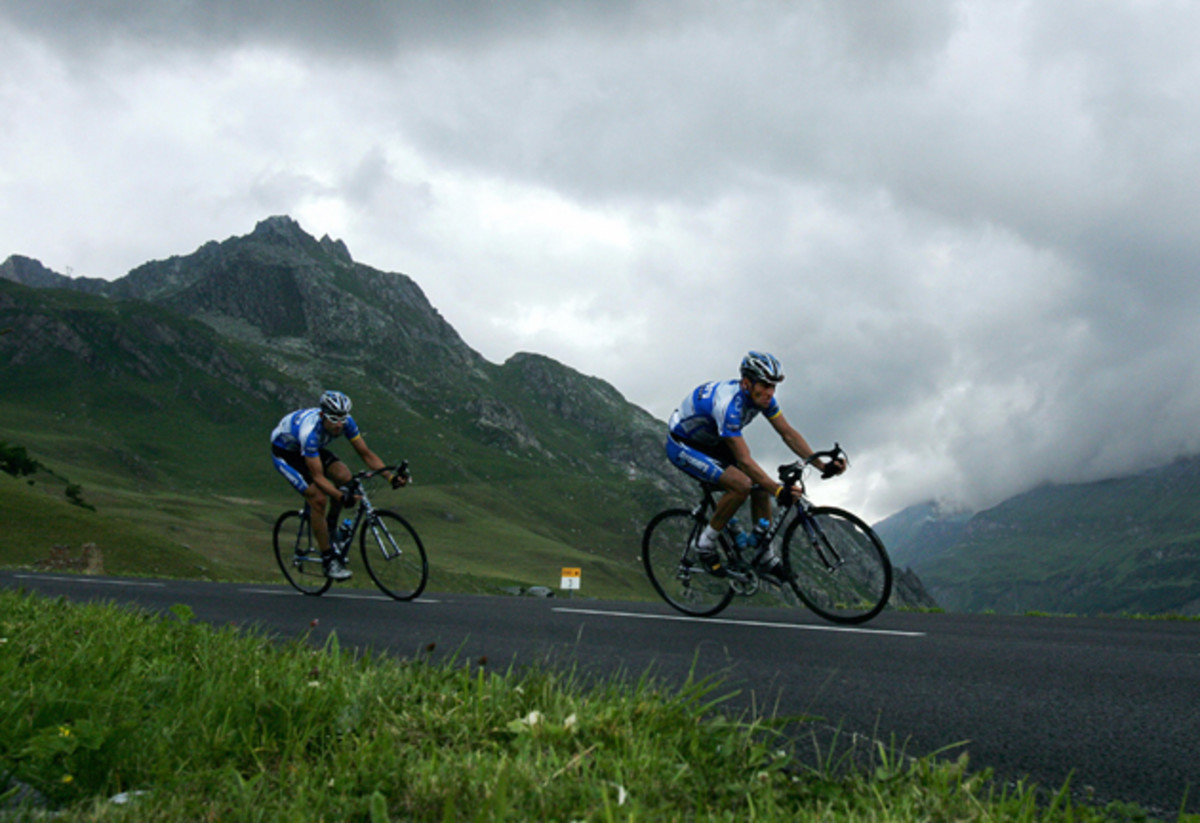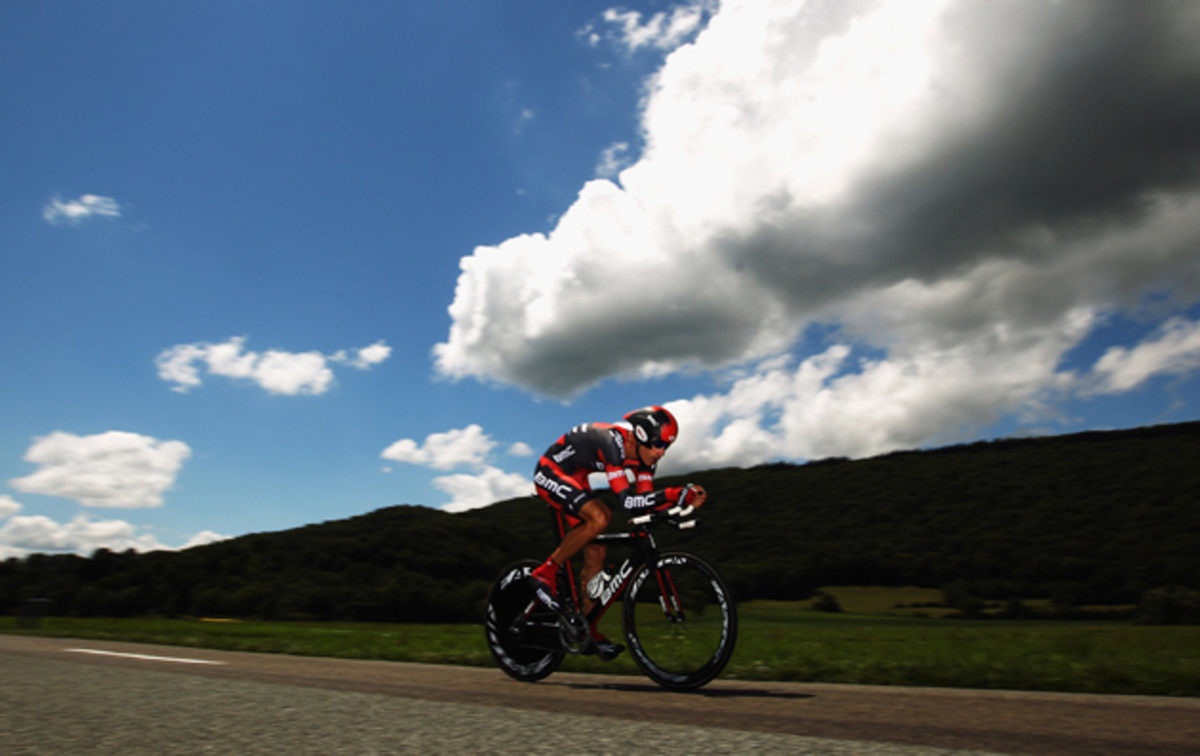Q&A: George Hincapie Throws a New Light on His Role in Cycling's Doping History

Like a promising stage race, George Hincapie’s new book, The Loyal Lieutenant, begins with a dramatic prologue, in which the subject receives a voicemail from Jeff Novitsky, “a modern day Eliot Ness” whose “reputation for investigating drug use in sports was legendary.”
Gentleman George, one of the most well-liked riders in the pro peloton, embodied the sad, seamy paradox of his era: he was a genuinely good guy who, like the majority of riders around him, built his career on deception. He raced professionally for 18 years and doped for 12 of them. Hincapie earned a measure of redemption by going cold turkey in 2006, swearing off PEDs, and harnessing the respect he’d earned in the peloton to advocate for clean riding—with mixed results, as we shall see.
Throughout our Q&A with him, and without prompting, Hincapie expressed regret and contrition for his decision to dope. In the book, capably co-written with Versus cycling analyst Craig Hummer, his tone is slightly less apologetic, more pragmatic, realistic. Taking EPO, testosterone and HGH, transfusing his own blood—this was the cost of doing business. In his mind, he wasn’t cheating when he doped: “It was the thought of not letting myself getting cheated by others that drove me.”
While the Federal investigation of Lance Armstrong was eventually (and controversially) dropped, the troubles for the Texan had only just begun. Following Novitsky’s probe—drafting off it, if you will—was the U.S. Anti-Doping Agency. If Novitsky was Eliot Ness, USADA CEO Travis Tygart was Inspector Javert from Les Miserables. His comprehensive investigation brought down Armstrong, and in so doing pulled back the curtain on PED use among many American riders from that era. Tygart, at long last, dashed the omerta that had governed the peloton for decades. Riders who’d suffered like dogs for Armstrong on the road were not willing to perjure themselves for him.
Not even the Loyal Lieutenant, Big George himself, a huge talent whose fate it was to arrive on the pro cycling scene just as Armstrong’s star was rising. In a double-dose of bad timing, Hincapie started racing in Europe just as the blood-booster EPO was washing over the pro peloton.

EDGE:You’re 20, 21 years old, you’ve got 150,000 miles of training in your legs, and suddenly you’re faced with the choice: dope or go home. Talk about that realization:
George Hincapie: It was awful. I went from being kind of a child prodigy, barely anybody beating me here in the U.S., going to Europe and early on winning a couple stages of the Tour of Luxembourg as a 20-year-old kid—I went from that to all of a sudden [in 1994], you can’t stay with the fattest guy in the peloton up a climb, while he’s just chatting away with his friends. I was consumed by the sport, training just as hard as ever, putting in six-, seven-hour days [and still couldn’t keep up]. I thought, Wow, I can’t train any harder. So eventually, I succumbed, to the dark side.
EDGE:Let’s backtrack to your boyhood, growing up in Queens—not exactly a hotbed of cycling. What was your path to pro cycling from one of the outer boroughs of New York City?
GH: A lot of people have seen my book and are gonna say, ‘Look, another doping book.’ Well, it’s not a doping book. It’s fairly unique, the way I grew up racing in Central Park and Prospect Park, pushed around by older European riders, South American riders. The book is a lot more than just about doping, it’s as much about my growing up in the sport before I made some of the decisions that I’m not happy about.
It’s also about some of the things I did that I’m proud of. I was part of a big change in the sport. I saw a major cultural shift in cycling, and I like to think I was a small part of that.
RELATED: Welcome to the Hotel Hincapie: A Cyclist's Dream Destination
EDGE:In Chapter 9, you write about discovering EPO in 1996 in the refrigerator of the apartment you shared with Motorola teammate Frankie Andreu, in Como, Italy. You describe that as an “epiphany”—the moment you realized that you were going to have dope, as well. Are you blaming Andreu for the fact that you doped?
GH: Frankie was seven years older than me, he was my mentor. I don’t know if he realizes how much of an influence he was on me. I wanted to be like Frankie. That said, I want to be totally clear: I don’t want to blame Frankie. [Hincapie’s decision to dope] would have probably—no, most definitely—happened anyway. But that’s how that instance affected me and influenced me. That was my ‘Aha!’ moment.
EDGE:Let’s drill down a little deeper on what it means to be adomestique. Throughout Armstrong’s seven-year run, Phil Liggett and Paul Sherwen praised you for getting Lance to the front of the bunch when the road narrowed, when the threat of crashes loomed.It sounds pretty straightforward—get your leader to the front—until you reflect on the fact that every team is trying to get its leader to the front.
GH: Unless you know a lot about the sport, it’s hard to appreciate how hard that is. It’s really an art form, you have to able to not just get to the front, but bring a guy like Lance with you, which means when you’re shooting these tiny holes, you have to make sure they’re big enough for the two or three guys that are sitting on your wheel. Meanwhile, 200 riders are trying to do the same thing. And for some reason, I was always really good at that.

EDGE:Did it help that you were known as one of the good guys in the bunch, that you didn’t have many enemies?
GH: Not really. When it’s crunch time, most of the guys will not budge. You have to find that little moment where the road opens up slightly for 10 meters where you can sprint around, or jump on a sidewalk. Stuff happens in those moments that is pretty intense and pretty insane.
But, yeah, sure, there were times when I’d look back and see somebody that I like, an ex-teammate, and I’m not just gonna close the door on them on purpose. I’ll move over, and I’m sure that’s happened to me on many occasions as well.
EDGE:You write about a close call in 2006, injecting EPO one night, then getting a text the next day from your wife, Melanie, informing you that testers were waiting for you at your apartment. You instructed her to rent a car and meet you at the train station. That close call, and its immediate effect on your family, inspired your decision to stop doping. Thereafter, you became an advocate for clean riding in the peloton. Talk about that.
GH: The change happened from within. A generation of riders said, ‘Enough is enough. We need to change.’ We [Hincapie and like-minded riders] started sending a strong message through the peloton: Hey, we need to start changing this if we want this sport to last. And we have witnessed a significant change.
in the peloton.
EDGE:That message seems to fallen on receptive ears, save for one conspicuous example. [When Hincapie tried to persuade Floyd Landis in June of ’06 to board the clean train, Landis “squared his jaw, looked me right in the eye and said, ‘F___ you, George. I want to win the Tour de France.’”]
GH: [laughing] Who can really blame him? Who am I to tell him not to do it? He thought he had a chance [to win], he still probably thought a lot of people were doing it.
RELATED: Cycling Champ Bradley Wiggins is Back in High Gear
EDGE:In 2005, you got into an early breakaway and ended up winning the most difficult stage of the Tour de France. While you’re completely candid about your doping throughout the book, you don’t mention your use of PEDs while writing about that stage win. Meanwhile, you take pains to point out that during Floyd’s incredible, implausible win of Stage 17 the following year, that he was “doped to the gills.” Couldn’t he turn around and say the same thing about you?
GH: Absolutely, there’s no question that we both—and many people in the story—crossed the line. Floyd’s got a right to be angry. He’s been kind of chewed up and spit out by the sport. I understand his anger. But right now, I’m telling that story, it’s a true story, but to point fingers at Floyd or anybody is not gonna help the sport move on. The reality is the sport is in a much better place now.
EDGE:By the end of the book, you’re being grilled by the Feds, then by Tygart, the primary author of USADA’s “Reasoned Decision,” which described the US Postal Service team as having run “the most sophisticated, professionalized and successful doping program” in cycling history. By then you’d been racing clean for six years. You write that this was frustrating, digging up the past when the sport had begun to heal from within.
GH: Yeah, that was frustrating. But I want to emphasize, I made the wrong decision, I was part of the [doping] culture, I succumbed to a lot of wrong things during that era, and you know, I probably deserved to go through that, even though at the time I thought it wasn’t good for our sport, because of how much I felt it had changed. I felt like [the investigations] were going to bring it all back up again, which they did, in many respects. But I definitely own up to making the wrong decisions.”
I have a much different outlook, a different value system, than I did in my 20s, in my early 30s. I truly felt that, since everybody’s doing this, how could it be wrong? Now looking back, I’m saying, “F__ of course it was wrong! It doesn’t matter if everybody was doing it. We were all wrong.”
